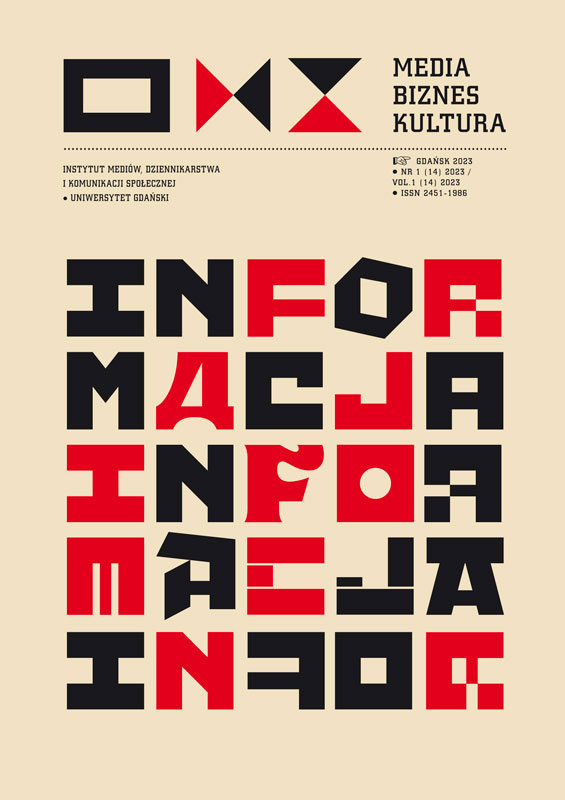Game of Thrones’ Fandom. Power and culture in fan communities
Keywords:
fan, fandom, Game of Thrones, cultural studiesAbstract
Fans represent a shift in media consumption, and their patterns of behaviour are increasingly visible outside their communities, in other groups. With the observed shift towards a network society, of which fandoms are an emanation, the field of social conflict begins to operate within culture. Cultural power over media products no longer belongs only to the creators, but is also influenced by the users, who cease to passively consume products, creatively interpreting tchem and engaging in their development. The aim of the article was to show this process on the example of content analysis of internet entries created within the environment of the Game of Thrones fandom, including speculations which the fans of the brand carried out in the context of the plot development.
Downloads
References
„A Forum of Ice and Fire” 2018, https://asoiaf.westeros.org/ (dostęp: 24.05.2022).
About, „Westeros. The ‘A Song of Ice and Fire’ Domain” 2018, http://www.westeros.org/About/ (dostęp: 24.05.2022).
Season 7, „Game of Thrones. Wikia” 2018, http://gameofthrones.wikia.com/wiki/Season_7 (dostęp: 24.05.2022).
Castleberry G., Game(s) of Fandom. The Hyperlink Labyrinths That Paratextualize Game of Thrones Fandom [w:] Television, Social Media, and Fan Culture, eds. D. Givens-Carroll, A.J. Narro, A. Slade, Lexington Books, Lanham 2015.
Dijk J. van, Społeczne aspekty nowych mediów, tłum. J. Konieczny, Wydawnictwo Naukowe PWN, Warszawa 2010.
Duffett M., Understanding Fandom. An Introduction to the Study of Media Fan Culture, Bloomsbury Academic, New York 2013.
Goodman L., Disappointing Fans: Fandom, Fictional Theory, and the Death of the Author, „The Journal of Popular Culture” 2015, Vol. 48, No. 4, http://onlinelibrary.wiley.com/doi/10.1111/jpcu.12223/full (dostęp: 31.01.2022).
Jenkins H., Fans, Bloggers, and Gamers: Exploring Participator Culture, NYU Press, New York 2006.
Jenkins H., Textual Poachers. Television Fans and Participatory Culture. Updated Twentieth Anniversary Edition, Routledge, New York 2013.
Lipińska A., Fenomen współczesnych seriali. O społecznym oddziaływaniu seriali telewizyjnych, „Konteksty Kultury” 2016, nr 13, z. 3, https://www.ceeol.com/search/article-detail?id=558967 (dostęp: 31.01.2022)
Lisowska-Magdziarz M., Fandom dla początkujących. Część I Społeczność i Wiedza, Wydawnictwo ToC, Kraków 2017.
Lisowska-Magdziarz M., „Scherlock”. Gry z fandomem i wykorzystanie potencjału konwergencji, „Zeszyty Prasoznawcze” 2016, t. 59, nr 1(225), s. 197–211.
Roberts K., Lovemarks: The Future beyond Brands, powerHouse Books, New York 2005.
Roszczynialska M., Świat wartości fanów fantasy w świetle ich praktyk (para)literackich. Perspektywy badawcze [w:] Oblicza nowych mediów, red. A. Ogonowska, Wydawnictwo Wyższej Szkoły Zarządzania i Bankowości w Krakowie, Kraków 2011.
Siuda P., Kultury prosumpcji. O niemożliwości powstania globalnych i ponadpaństwowych społeczności fanów, Oficyna Wydawnicza ASPRA-JR, Warszawa 2012.
Stadler F., Manuel Castells. Teoria społeczeństwa sieci, tłum. M. Król, Wydawnictwo Uniwersytetu Jagiellońskiego, Kraków 2012.
Szczepaniak R., „Plemiona Sieci” – Internet jako medium społeczne i kulturowe, „Zeszyty Prasoznawcze” 2015, t. 58, nr 1(221), s. 202–211.

 Academic Scientific Journals
Academic Scientific Journals




